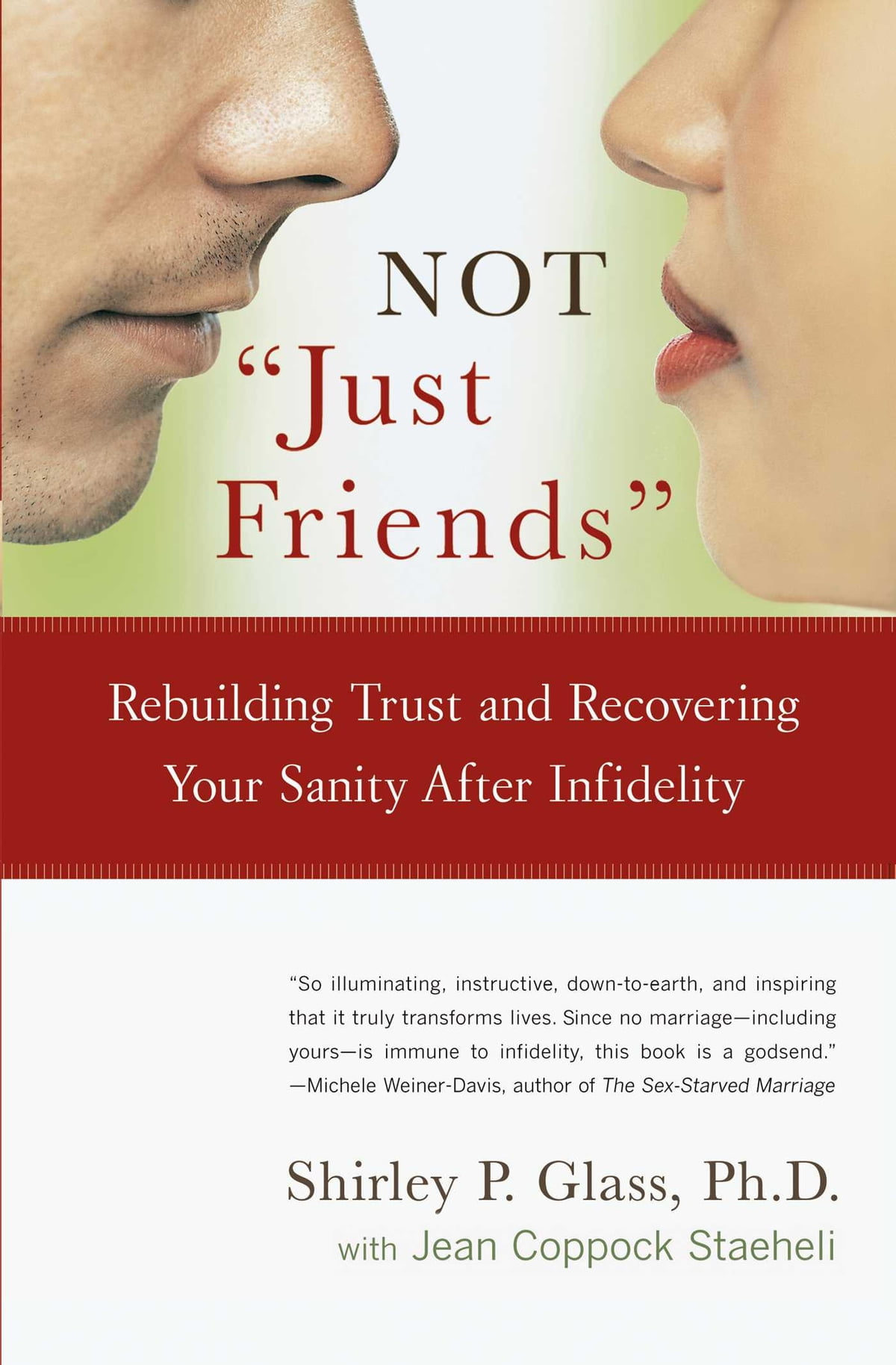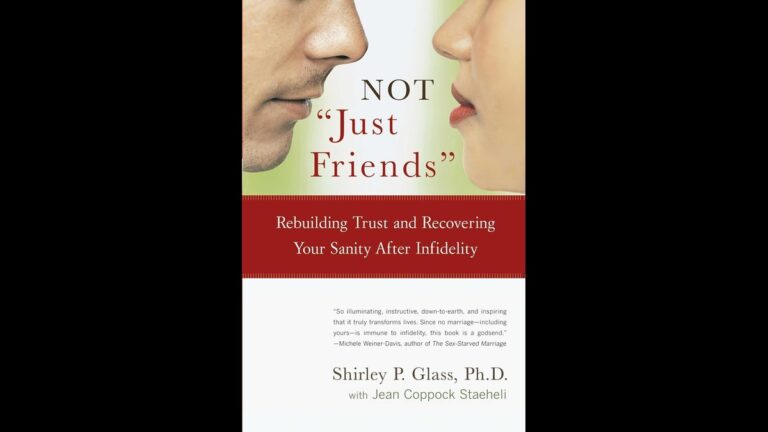Editorial Reviews of NOT “Just Friends”
Publishers Weekly
Refusing to pander to audiences expecting Dr. Phil-type quick fixes, Glass (who has appeared on Oprah herself) chooses “a new, fact-based, scientifically and therapeutically responsible approach” to a subject she contends is fraught with public and professional misconceptions. Drawing on research studies (her own and others’) and clinical cases from her 25 years as a psychotherapist, she explores “the new crisis of infidelity” resulting from platonic relationships that become progressively intense.
Personal and professional friendships between men and women have become so prevalent and accepted that, according to Glass, even “good” people in “good” marriages can be swept away in a riptide of emotional intimacy more potent than sheer sexual attraction.
Glass scrutinizes affairs and offers well-defined guidelines, including tips for determining how vulnerable individuals and relationships are to temptation, and prescriptions for keeping relationships “safe,” repairing betrayal-induced damages and recovering from the trauma. Glass’s credentials and commitment lend this book credence as a valuable resource; Staeheli’s easy, personable style and the well-organized format make it user-friendly, too.
Library Journal
With 25 years of experience as a relationship counselor and a psychological researcher, Glass is well qualified to offer advice on dealing with infidelity. Here, she combines personal observations with a well-documented trove of scientific sources to provide a “prevention manual and survival guide.”
Numerous stories and examples, several quizzes, and, most significantly, the narrative of a couple going through the entire betrayal and recovery process make the book easy to read. Glass is careful to address the issues of all concerned parties-those who have been unfaithful, those who have been betrayed, and even the betrayal partners.
She debunks several myths about infidelity, showing how today’s affairs differ from those of yore, and allows us to feel the fears, pain, and motivation of various players at each step along the path. Although built on a solid academic base, this is an accessible book, ideal for anyone in a marriage, stable or otherwise. Recommended for general and academic collections. -David Leonhardt, Chesterville, Ont. Copyright 2003 Cahners Business Information.
Booksense.com
Glass brings 25 years of experience as a successful psychotherapist to this perceptive, blunt, and accessibly written treatise on extramarital relations. What Glass calls “the new crisis of infidelity” refers to a recent rise in two-timing, and is classified as any hidden emotional, sexual, or romantic involvement that occurs outside of an exclusive relationship.
She explains how people in a relationship can overcome the trauma of infidelity, but perhaps more importantly, describes pragmatic preventative measures that can help a couple avoid betrayal. Not “Just Friends” is a thoughtful and attentive book of good advice and welcome hope.
The Cleveland Plain Dealer
An insightful analysis of infidelity, by Pam Lilley
A woman beckons her husband to their bed room upon his return from work. She’s wearing a blond wig. It’s an inside joke; he had an affair with a blonde. But it’s over, and after a struggle, their marriage is on the way to recovery. Now it’s time for some fun.
This is the happy ending to one of many case studies in “Not ‘Just Friends,’ ” Shirley Glass’ fascinating new book on infidelity. Had the story appeared at the beginning, readers might be appalled that the wife could look on the betrayal so lightheartedly.
Wisely, author Glass saves it for the end, after walking us through every painful stage of cheating, from suspicion to discovery to healing.
For those fortunate to be reading purely out of sociological interest, Glass identifies alarming new trends, shares intriguing statistical data from her research and disputes common myths. “You can have an affair without having sex,” she writes, claiming that being emotionally involved with someone outside a marriage counts as cheating.
Among the trends: Adulterous husbands are increasingly likely to become emotionally involved with their lovers, and more wives are becoming sexually involved with others.
For someone who has discovered that a spouse is fooling around, a gun might seem handier than a book. But Glass (mother of Ira Glass of public radio’s “This American Life”) has straightforward, compassionate, nonviolent advice.
Unlike many therapists, she asserts that trust can be restored only if the unfaithful partner answers every question about the affair. And healing only can occur if all contact between the lovers is severed.
Glass’ primary goal is to help save marriages. The case studies provide rich illustrations of the pitfalls and triumphs the recovering couple can experience. The book also includes chapters for those who get dumped. No book can guarantee an affair-proof relationship.
But “Not ‘Just Friends’ ” provides an impeccable detailed map that lets readers know where the potential hazards lie. It’s up to the reader to use it to avoid what might appear to be a more scenic route.
3/09/03 Lilley is a teacher and writer who lives in Cleveland Heights.
Girlposse.com
I have never been personally involved in an extramarital affair – so I wasn’t sure if this book would be of interest. I’ve never understood affairs, and I don’t believe in them. I was happy to discover some real pieces of wisdom within the pages.
In particular was an explanation that having an attraction to someone other than your spouse is normal. It doesn’t mean that you chose wrong – or that your marriage is in danger. It is what you do about the attraction that is important.
There are people we will find attractive in our life. It is normal! The other often overlooked fact is that people that tend to have affairs have friends that have affairs. It isn’t a fact for everyone – but it is easy to see that if you’re on the fence about having an affair and your friends are supportive of this – you’re more likely to follow through. Birds of a feather flock together and all that jazz.
Personally I could never stay married if I or my husband had an affair – so all of the chapters about healing your marriage didn’t do much for me. Although they did have some great communication lessons that could help any relationship – surviving an affair or not. However – I think it is important for single women (and men – but they never read – LOL) that are having an affair with a married man to read this book. If not to gain some insight to their own behavior – then to see what they are destroying in the process.
I also have to add that it is possible to be “just friends”. Don’t let the title make you think otherwise. I happen to be “just friends” with lots of guys. But maybe that’s just me….. 🙂 ~Trixie, February 2003
CelebrityCafe.com
“Good people in good marriages are having affairs. Well-intentioned people who never intended to be unfaithful are unwittingly forming deep, passionate connections before they realize that they’ve crossed the line that separates platonic friendship from romantic love.
Today’s workplace and the Internet have become the new danger zones of attraction and opportunity – the most fertile breeding grounds for affairs.”
So says Dr. Shirley Glass in her new book, Not “Just Friends”. A therapist and one of the world’s leading experts on infidelity, Dr. Glass puts her experience into print chronicling “the human story of what occurs before, during, and after the trauma of betrayal.”
By her definition, infidelity is any clandestine “sexual, romantic, or emotional involvement that violates commitment to an exclusive relationship,” and in the book she shows how none of the aforementioned are ever innocent.
Recently, Dr. Glass has noticed that it is not thrill seekers who have affairs, but people who have friendships that seem to start out innocently enough while all the while the signs of crossing the line into infidelity are present, if only one cares to look for them.
The resulting affair not only puts enormous emotional strain on the individual’s marriage and partner, but often on the individual themselves as they deal with the guilt of having an affair.
Meanwhile, the passion of an affair is often short-lived. Studies have found that only 10 percent of those who leave a marriage partner will go on to marry an affair partner, and of those, 75 percent end up getting divorced from their affair partner, as well.
And recovering from an affair is no easy endeavour, since the recovery plan Dr. Glass uses with her clients is similar to those used for natural disasters, war, accidents and violence.
In a nutshell, Dr. Glass says, “In a love affair, the unfaithful partner has built a wall to shut out the marriage partner and has opened a window to let in the affair partner.
To reestablish a marriage that is intimate and trusting after an affair, the walls and windows must be reconstructed to conform to the safety code and keep the structure of the marriage sound so that it can withstand the test of time.”
Her book includes quizzes to help you determine if one of your – or your partner’s – friendships has crossed the line into infidelity, or if one of your relationships with an online correspondent has strayed into romance.
Dr. Glass seems to have thought of everything, including the difference between “irrational jealousy and rational jealousy.” She even offers advice on what to do if you know a friend or relative is having an affair.
These days, the Internet seems to present a considerable threat for, as Dr. Glass points out, “Emotional intimacy quickly develops on the Internet because freedom from distractions and lack of social constraints promote a form of free association that allows you to say anything that comes to mind.”
Dr. Glass has written the bible on infidelity in Not “Just Friends,” explaining how to prevent an affair or, if one has occurred, how to heal emotionally. For those whose lives have been touched by an affair, Dr. Glass walks us through the difficult recovery process step-by-step.
Islam Online
New Book Takes Quasi-Islamic Stance On Relationships
“I’m sorry, but I don’t shake hands with members of the opposite sex.” This line can be heard coming from Muslims working in office settings everywhere.
Islamic standards of modesty warn against even casual physical contact between unmarried men and women. This, of course, can cause uncomfortable situations in places of business where it is customary to shake hands with colleagues. But Muslims have long known that even casual, seemingly innocuous contact as well as casual behavior between the sexes can lead a person astray into either marital infidelity or inappropriate pre-marital relationships.
Until recently, it seemed that it was only Muslims that felt this way. But in her book, Shirley Glass gives credence to time-honored Muslim traditions on the issue of inter-gender office relations.
Glass’ main thesis is, for all intents and purposes, Islamic in character. She asserts that unguarded, casual office relationships between men and women often lead down a slippery slope towards extra-marital affairs. And according to Glass, this phenomenon does not apply solely to the spouse with a wandering eye; even strong, nurturing marriages can be rocked by office romances.
Glass, who has studied martial infidelity over the last 25 years of her career as a psychotherapist, found that 25 percent of women and 44 percent of men have strayed from their marriages.
And although the cliché of the office romance has been around for quite some time, Glass says that the typical lustful physical relationships that often develop are but one aspect of illicit office behavior. For Glass, it is the more personal friendships that develop in the office environment that pose a greater threat to marital stability.
Speaking recently to Connie Chung on CNN, Glass noted, “The crisis is that … men and women are working with people that they respect, people that they have intellectual interests with, people that they share excitement over projects, frustration over deadlines. And so the relationship begins as a platonic friendship that’s very deep and rich. And what happens is that, over time, they begin to share more and more of their personal lives together.”
This type of intimate sharing of personal thoughts and feelings is, Glass asserts, more detrimental to marriage because, unlike casual sexual encounters, these interactions create strong bonds between the people. And once this level of personal intimacy grows, the dreaded sexual affair is just on the horizon.
For Glass, the answer to this problem is to establish what she calls “walls and windows” by which married couples agree to keep emotional distance from people outside the marriage while keeping open channels within the marriage.
The resemblance to Islamic standards of modesty is uncanny, although Glass does fail to call for the true Islamic solution, which erects clear boundaries between the permissible and impermissible.
Glass is just one of several authors to recently take a more conservative tack regarding marriage and relationships. And in many instances, themes that have elements of solid Islamic common sense are finding favor over the more liberal trends that have predominated in popular culture. By Ali Asadullah
Issues Magazine
Shirley Glass is a relationship counselor and psychological researcher with 25 years of professional experience to her credit. NOT “Just Friends” seems to be the culmination of a life’s work.
Glass combines personal observations with a well-documented trove of scientific sources to provide a “prevention manual and survival guide”. It is on the basis of her own experience and the many other well-documented sources that the book stands as credible.
Although based on a strong academic foundation, the book is made easy to read by numerous stories and examples, by several quizzes, and most of all by following a single couple through the entire betrayal and recovery process.
Perhaps the strongest point about NOT “Just Friends” is that Glass is careful to address the issues and feelings of all concerned parties, those who have been unfaithful, those who have been betrayed, and also the betrayal partners. She debunks several myths about infidelity, explains how today’s affairs differ from those of the past, and draws us inside the various players to understand their fears, their pain, and their motivation at each step along the path.
Prevention and survival are not necessarily the same thing, of course, as the markets for the two are quite different. In fact, the weak point of this book may be an attempt to include too many ideas into one volume. I could easily recommend the prevention chapters at the beginning to anyone in a marriage, but I doubt they would be interested in reading the majority of the book, which focuses on coping with an affair.
Similarly, someone looking for advice on how to cope with a fair is unlikely to want to read through the prevention aspects.
This is a sensitive, well-founded, easy-to-read book, but make sure it is for you before buying it. by David Leonhardt







